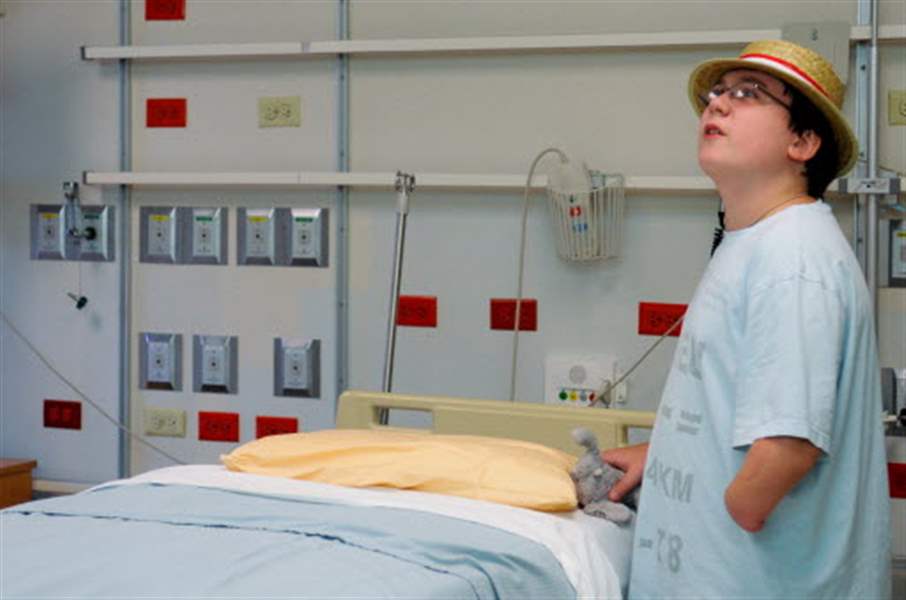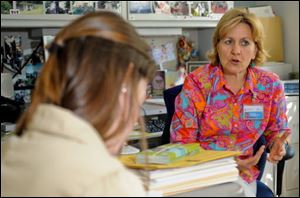
Shriner's: not just tiny motorcycles and funny hats
9/20/2010
William Cagle revisits the room he stayed in five years ago.
CINCINNATI - When other children ask 12-year-old William Cagle what happened to his left arm, he sometimes jokes: "An alligator ate it."
Humor is a frequent tool employed by children who have suffered life-altering illnesses and injuries, says counselor Cindy DeSerna, manager of family services and care coordinator at Shriners Hospital for Children in Cincinnati.
William, now a seventh grader at St. Johns Jesuit Academy in Toledo, underwent a left-arm amputation at the hospital five years ago when serious complications set in after he broke the limb in a fall.
Most children admitted to hospitals recover after a short while and quickly re-enter the routine of home and school. But a few who experience more serious problems must acquire strategies for adapting to life and peers that they wouldn't otherwise have needed.

Cindy DeSerna, manager of family services and care coordinator at Shriners for Children in Cincinnati, is interviewed by an intern in the public relations department at the hospital.
Increasingly, institutions such as Shriners Hospital in Cincinnati are trying to ease that process.
"We have to look at the big picture," Ms. DeSerna says. "We treat the whole family, the whole culture."
The 30-bed facility, part of a nationwide network of hospitals sponsored by the Shriners International fraternal organization that provide care for children regardless of ability to pay, specializes in burn wounds.
Because of the lengthy treatment and convalescence involved in those injuries, patients are sometimes hospitalized for months.

William Cagle revisits the room he stayed in five years ago.
Before patients are released, Ms. DeSerna visits the child's school to discuss his or her condition with classmates.
Without going into explicit detail, she explains why the child has been absent and other changes classmates might observe. While she recognizes that drawing attention to an illness in such a direct fashion might hold a child up to ridicule, "I know from experience that if we do nothing, children are going to make it more difficult," she says. "Burns are usually highly visible issues. Kids can see them."
Mercy Children's Hospital, Toledo, offers a similar service for patients in its pediatric cancer unit.
Vanessa Fitzpatrick, a social worker in the unit, estimates that she visits five or six schools year.
"Some of our patients are in wheelchairs," she says. "Some may have central lines [for medication administration]. They may not have hair. We can go into a class and educate peers about why the child is like that. We educate them about what to expect."
Besides school visits, the Cincinnati hospital participates in a national peer-support program that introduces patients to other children and teens who have dealt with health problems they are confronting.
Humor can be an effective weapon for deflecting unwanted inquiries, Ms. DeSerna says.
"One of our patients tells other kids he ran into a burning building and rescued a beautiful girl," she says.
To help patients adjust physically, they work with physical and occupational therapists.
William, who lives with parents Robin and Kevin Cagle in Bowling Green, had to make adjustments after the amputation at age seven.
He and his parents decided that it would be too difficult to continue learning the piano with just one hand, so he gave up the instrument. Instead, he took up the coronet, which proved easier to master and plays the guitar with a specially adapted pick.
He was able to jump-rope and play softball - each with minor adaptations.
While hospitalized in Cincinnati, William and his parents were encouraged to make field trips to accustom him to being in large crowds.
"People are going to look at you," Robin Cagle says. "It's human nature. It's better to do it when you can return to a safe environment."
Staff members helped prepare William for what he would face when he left and were "very individualized with each child," Mrs. Cagle says.
William's classmates were kind and asked few questions when he returned to the first grade in Bowling Green after the amputation.
As he has gotten older, younger children have been the most intrusive. They want to touch and poke his prosthesis or demand that he "take it off."
Before leaving the Cincinnati hospital, patients are schooled in possible responses to inquiries about their injuries or illness.
"We tell them not to share a lot of details," Ms. DeSerna says. "That's their private information."
Contact Gary Pakulski
at gpakulski@theblade.com
or 419-724-6082.